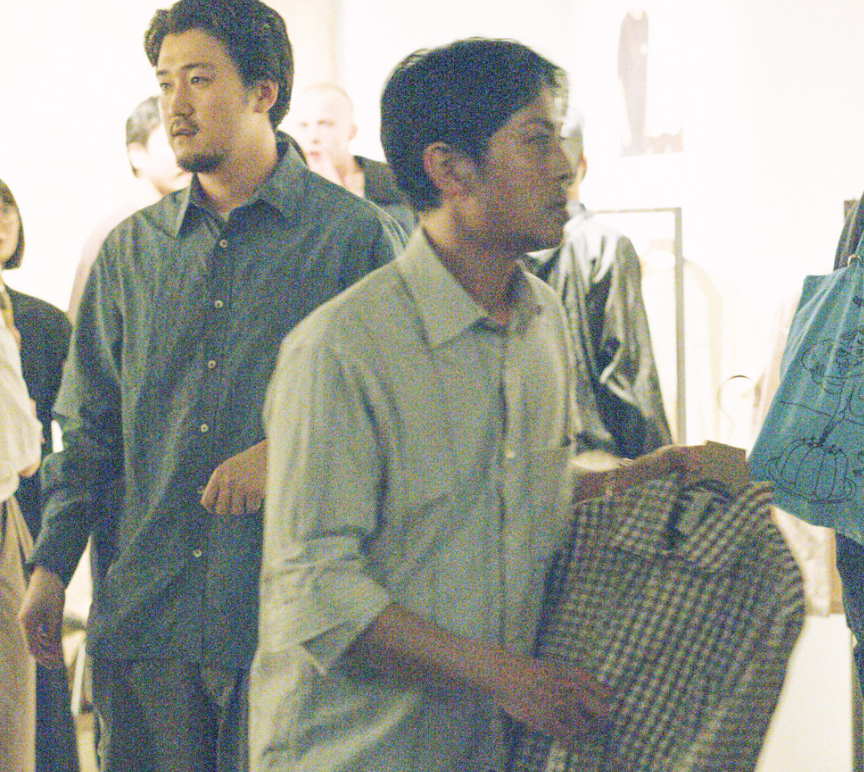
In a fashion world that too often prizes exclusivity, the flow between Copenhagen’s ANOTHER ASPECT, New York’s COLBO, and Tokyo’s ESTNATION offers something different: inclusivity with purpose. This isn’t just a pop-up. It’s a field study in modern community-building—conducted through style, space, and social cross-pollination.
From April 18 to May 7, the three forces converged at ESTNATION Roppongi Hills for a collaboration that wasn’t about seasonal trends or product drops—it was about people. And on April 18, they kicked off with a reception party at TRUNK(HOTEL), bringing the full force of their vision to life, complete with the designers themselves flying in for the occasion. What unfolded wasn’t just a retail activation. It was a glimpse into what fashion could become when it stops selling solely to individuals and starts connecting entire scenes.
Three Cities, One Vision
This wasn’t the first time ANOTHER ASPECT and COLBO worked together. It’s the third, in fact—but the first time on Tokyo soil. Their relationship has been evolving over years and across borders, organically fusing like-minded philosophies rooted in authenticity, locality, and long-term thinking.
Daniel and Anders of ANOTHER ASPECT, and Tal of COLBO, have shared sensibilities that made the Tokyo project feel less like a plan and more like a continuation of an ongoing dialogue.
“What we’re doing in Copenhagen and what they’re doing in New York—it overlaps in so many ways,” Daniel said. “We both run spaces that aren’t just shops. In our case, there’s a café—La Cabla—attached to the store where we host events that really serve the community. COLBO is the same. Bringing that to Tokyo was a natural next step.”
For Tal, the connection was always about more than product.
“Doing something together felt easy,” he explained. “Our customers, our scenes—they overlap even when separated by thousands of miles. When Junya [Kawamoto] from ESTNATION started showing interest in what we were building, we knew it was time to connect those worlds.”
An Ecosystem, Not a Store
Junya Kawamoto, a buyer for ESTNATION, encountered both brands not just through their clothes, but through their energy. He remembers walking into their showrooms—not stiff or sterile, but alive. Music playing, wine flowing, conversations happening. Real connections.
“Yes, the clothes are great,” he said, “but that wasn’t what struck me. It was the vibe. It was the fact that they were treating their spaces as places to gather, to be. That made a deep impression. ESTNATION positions itself as a lifestyle store, not just fashion retail. What they were doing felt like a perfect fit.”
Kawamoto’s instinct to bring them into the Tokyo fold was rooted in that shared DNA. Not in trying to mimic the West, but in crafting a Japanese edition of their ethos—a version shaped by Tokyo’s own culture, pace, and style.
The Reception: Not Just a Party
On April 18, when the pop-up launched with a reception at TRUNK(HOTEL), the theory was tested. Could this model of community translate in Tokyo? Could a one-night event signal a shift?
The answer, based on who showed up and how they interacted, was yes.
Attendees spanned a wide range of backgrounds—designers, writers, students, small business owners, DJs, academics. They weren’t there just to buy. They were there to talk. To meet. To feel something.
And the vibe wasn’t performative. No velvet ropes, no forced exclusivity. People crossed professional lines and social roles. It was a crowd that embodied a new vision of fashion’s place in the city—as glue, not just garnish.
Rewriting the Rulebook
What’s remarkable is how this collaboration subtly rewrote the rules of what a pop-up can be. Most such events are commercial exercises. Flashy, short-term, and aimed at creating artificial scarcity. This was the opposite: spacious, slow, and meant to last—in memory if not physically.
COLBO and ANOTHER ASPECT didn’t fly in just to stage a photo op. They came to be in Tokyo. To talk with the people. To see what connects. The clothing, while beautifully constructed, was never the sole focus. It was a vehicle.
“We’re not just trying to expand our market,” Anders explained. “We’re trying to understand our global peers. To share, to learn.”
It’s an approach that resists the churn of the global fashion cycle. Rather than expand quickly, both brands have opted to embed—to build deep roots rather than wide reach.
From Boutique to Cultural Node
This shift—from store to space, from shop to scene—is part of a broader evolution in retail.
Once, a fashion brand could simply design clothes and open a boutique. Now, for independent brands especially, that’s not enough. To survive, they must cultivate ecosystems. Places where ideas and people can mix. Culture hubs. COLBO and ANOTHER ASPECT get this.
Their stores function like third places—a term borrowed from sociology describing spaces that aren’t work or home, but still vital for human interaction. Cafés, barbershops, record stores used to fill this role. Increasingly, it’s forward-thinking boutiques that are stepping up.
And ESTNATION’s willingness to amplify that shift signals something important about the future of Tokyo’s fashion scene. It’s no longer about importing styles. It’s about importing systems—new ways to activate physical space in an age where e-commerce threatens to make everything remote.
Community as Currency
It’s easy to talk about community in branding. It’s harder to actually build one. But COLBO and ANOTHER ASPECT have done just that—not through gimmicks, but through attention and care.
They know their customers by name. They host events that aren’t just about selling. They keep their spaces open to collaboration, to creative energy from outside.
That’s what made the Tokyo project feel authentic. It wasn’t about parachuting in with a foreign concept. It was about finding resonance with local energies and amplifying them.
“It’s not a takeover,” Tal said. “It’s a handoff. It’s collaboration.”
A Blueprint for the Future
If there’s a lesson in this collaboration, it’s this: the future of fashion isn’t just aesthetic. It’s structural. It’s spatial. It’s social.
This Tokyo pop-up wasn’t big-budget or celebrity-backed. It didn’t rely on scarcity tactics or PR tricks. But it made an impact—because it centered people. Real people, in real time, having real conversations.
And those conversations don’t end when the clothes come off the shelves. They ripple outward—into new friendships, shared projects, shifted perspectives.
Tokyo’s Turn
Tokyo is uniquely positioned to take this model and run with it. It already has the density, the curiosity, the design literacy. What it sometimes lacks is permission—to experiment outside rigid frameworks, to blur boundaries between roles, disciplines, and industries.
COLBO and ANOTHER ASPECT gave a nudge. ESTNATION opened the door. Now it’s on Tokyo to walk through—and to build its own interpretation of what a community-driven fashion scene can look like.
Impression
In a time when fashion is often reduced to algorithms and drop calendars, this project reminds us of something essential: clothing is human. It touches people, places, rituals.
When brands take that seriously—not as a marketing line but as a guiding principle—they don’t just sell better. They matter more.
ANOTHER ASPECT, COLBO, and ESTNATION didn’t just team up to move units. They teamed up to move ideas. And in the process, they’ve offered a powerful, quiet blueprint for a more connected, more caring fashion culture.
One built not on noise, but on presence.
No comments yet.








